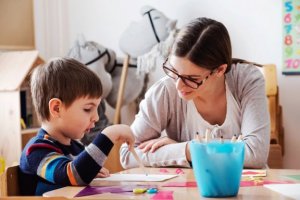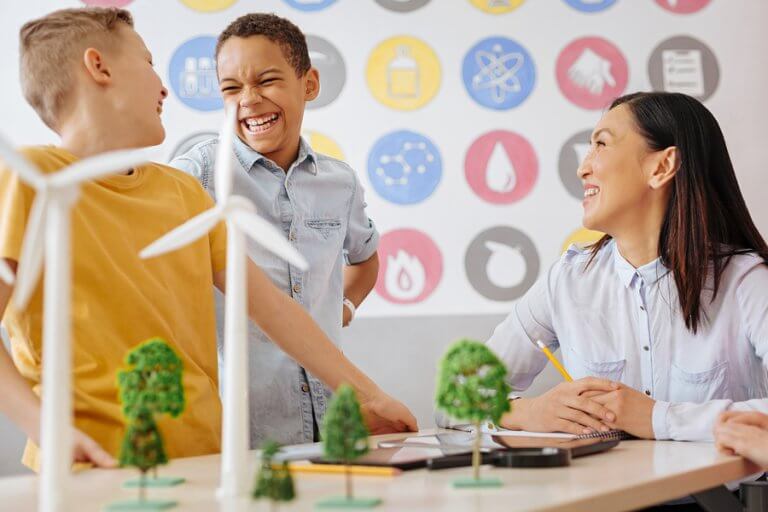How to Help Your Children Learn Effectively

Children learn effectively by connecting new concepts to previous knowledge and experiences. Discover ways to encourage effective learning in this article.
Through effective learning, children better retain new information, and their knowledge processes will be active and responsive throughout their lives. As you’ll see, it’s more important than it might seem at first glance.
How can you learn effectively?
When we’re exposed to new information, our brains relate it to previous knowledge that might be useful to better understand this new concept. This causes us to relate new concepts to previous experiences, activating meaning and logic.
This type of learning allows children to gain a complete understanding of new concepts and fully retain them in their memory. They can then form the basis for increasingly complex new learning. They serve as a framework and context to take on a variety of different situations.
How to teach your children to learn effectively
Respect their time
Every child matures at a different pace, and it’s important to respect that. Usually there are established age ranges for learning various things. However, these are just approximations that are taken from an average.
You shouldn’t be concerned if your child doesn’t fit the average exactly. It doesn’t mean there is a problem. Pressure will only slow down your child’s natural development.

Let them make mistakes
Don’t constantly correct your kids, or keep them from making mistakes so they won’t be frustrated. There is nothing more effective than self-correcting methods.
A great example is the Montessorri method, in which the children themselves realize that they’ve made a mistake somewhere in the process when they see they didn’t get the right answer. This forces them to reason and learn from their mistakes.
Make them think
One of the key parts of effective learning is helping kids learn through questions. Invite them to question life in general. Help them look for an explanation for everything around them and be endlessly curious. You can do this by asking them questions, planting little seeds in their minds.
Be attentive to what motivates them
Individuals learn from all situations. This is even more true for your kids. Don’t judge their tastes; everything is useful for fostering effective learning. Superheroes, soccer, video games, stories, dolls…
They’re only tools to attract their attention and awaken their interest. If they’re excited about dinosaurs, learning about the Earth, the universe, animals… anything can be fascinating.
You can even support reading in the youngest kids with their album of soccer players by inviting them to read the names of their favorite players. Find out what gets them going and leaves them on the edge of their seat.
Celebrate their successes
Nothing is more motivating than knowing that you’re achieving your goals. Sometimes kids don’t even realize how much they’ve learned. Others need to validate their knowledge through you.

This doesn’t mean you have to constantly cheerlead every step they take. That could be counterproductive as it makes them addicted to constant approval from others.
Rather, say, “I see that you’ve done a lot of math problems without making any mistakes. Well done!” Saying things like this can be very helpful.
Life is a game
For kids everything is a game, so learning should be fun. Suggest memory games, fun activities that motivate kids and invite them to want to learn something new.
Children are able to learn faster than we imagine, above all if we respect their pace, foster their creativity, and if they see that we’re also constantly learning.
Children learn effectively by connecting new concepts to previous knowledge and experiences. Discover ways to encourage effective learning in this article.
Through effective learning, children better retain new information, and their knowledge processes will be active and responsive throughout their lives. As you’ll see, it’s more important than it might seem at first glance.
How can you learn effectively?
When we’re exposed to new information, our brains relate it to previous knowledge that might be useful to better understand this new concept. This causes us to relate new concepts to previous experiences, activating meaning and logic.
This type of learning allows children to gain a complete understanding of new concepts and fully retain them in their memory. They can then form the basis for increasingly complex new learning. They serve as a framework and context to take on a variety of different situations.
How to teach your children to learn effectively
Respect their time
Every child matures at a different pace, and it’s important to respect that. Usually there are established age ranges for learning various things. However, these are just approximations that are taken from an average.
You shouldn’t be concerned if your child doesn’t fit the average exactly. It doesn’t mean there is a problem. Pressure will only slow down your child’s natural development.

Let them make mistakes
Don’t constantly correct your kids, or keep them from making mistakes so they won’t be frustrated. There is nothing more effective than self-correcting methods.
A great example is the Montessorri method, in which the children themselves realize that they’ve made a mistake somewhere in the process when they see they didn’t get the right answer. This forces them to reason and learn from their mistakes.
Make them think
One of the key parts of effective learning is helping kids learn through questions. Invite them to question life in general. Help them look for an explanation for everything around them and be endlessly curious. You can do this by asking them questions, planting little seeds in their minds.
Be attentive to what motivates them
Individuals learn from all situations. This is even more true for your kids. Don’t judge their tastes; everything is useful for fostering effective learning. Superheroes, soccer, video games, stories, dolls…
They’re only tools to attract their attention and awaken their interest. If they’re excited about dinosaurs, learning about the Earth, the universe, animals… anything can be fascinating.
You can even support reading in the youngest kids with their album of soccer players by inviting them to read the names of their favorite players. Find out what gets them going and leaves them on the edge of their seat.
Celebrate their successes
Nothing is more motivating than knowing that you’re achieving your goals. Sometimes kids don’t even realize how much they’ve learned. Others need to validate their knowledge through you.

This doesn’t mean you have to constantly cheerlead every step they take. That could be counterproductive as it makes them addicted to constant approval from others.
Rather, say, “I see that you’ve done a lot of math problems without making any mistakes. Well done!” Saying things like this can be very helpful.
Life is a game
For kids everything is a game, so learning should be fun. Suggest memory games, fun activities that motivate kids and invite them to want to learn something new.
Children are able to learn faster than we imagine, above all if we respect their pace, foster their creativity, and if they see that we’re also constantly learning.
All cited sources were thoroughly reviewed by our team to ensure their quality, reliability, currency, and validity. The bibliography of this article was considered reliable and of academic or scientific accuracy.
- Chacón, P. (2008). El Juego Didáctico como estrategia de enseñanza y aprendizaje ¿Cómo crearlo en el aula? Nueva Aula Abierta. https://documentop.com/el-juego-didactico-como-estrategia-de-enseanza-y-aprendizaje-_59fbb8cd1723dd47819deb98.html
- González, A., Aguaded, E., & Universidad, R. (2015). Aprendizaje cooperativo como aprendizaje efectivo. REIDOCREA.
- Vygotski, L. S. (1984). Aprendizaje y desarrollo intelectual en la edad escolar. Infancia y Aprendizaje. https://www.tandfonline.com/doi/abs/10.1080/02103702.1984.10822045
This text is provided for informational purposes only and does not replace consultation with a professional. If in doubt, consult your specialist.








